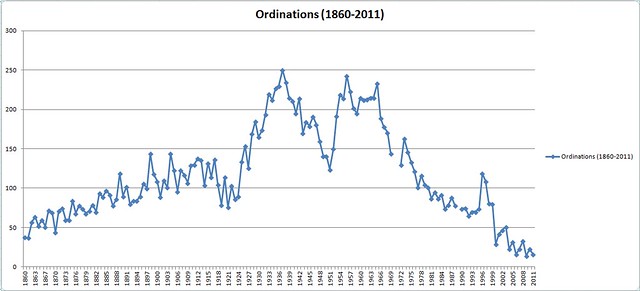In his post-mortem following Ireland's referendum on a constitutional amendment to allow same-sex marriage, Roberto de Mattei quotes Dom John-Baptiste Chautard from his book 'The Soul of the Apostolate' which always stuck with me:
A holy priest coincides with a fervent populace; a fervent priest - a pious populace; a pious priest - an honest populace; an honest priest - an impious populace.
Thus the idea is that the spiritual life of a congregation is one degree lower than the spiritual life of the priest who serves them.
When I was appointed rep for the Birmingham and Black Country area in May 2013, I believed my primary role was to bring the Mass of Ages to the people. Very quickly however, it became clear to me that an aspect of my role that was just as important was to aid priests. Priests would contact me wishing to learn and celebrate the 1962 Missal. They could of course do the latter without a congregation, but if the last year of lockdowns, social restrictions and church closures have proved anything, it is that Mass gains much from a congregation being present. I made an agreement with priests - if you provide the Mass, I will provide the congregation.
My first reaction upon reading Traditionis Custodes was not actually concern that traditional Catholics would be deprived of the 1962 Missal (notwithstanding the bizarre comment that we are expected to "return in due time to the Roman Rite promulgated by Saints Paul VI and John Paul II" which seems to ignore that in most parishes, from which the document would like to see the Missal of 1962 banned, it exists alongside the post-conciliar Mass and is not necessarily celebrated on Sundays or Holydays of Obligation). Although it would be more difficult to set up new groups and therefore Masses, Article 3 seemed to guarantee the right of people to attend Masses "antecedent to 1970" subject to the pastoral care of the Bishop, and most Bishops are concerned for the spiritual welfare of the traditional communities under their care. What concerned me more was Article 4, which dealt with priests, requiring them to obtain permission from the Bishop to continue celebrating the 1962 Missal, and for new priests ordained after the promulgation of the Motu Proprio, for whom the Bishop is to seek permission from the Holy See before granting authorisation. It is clear that this article is intended to make celebrating the 1962 Missal difficult in the short term, and in the long term impossible.
There has been much comment on the collapse in vocations since the 1960s, at least in the west. In England and Wales the true drop in numbers was somewhat tempered by the conversion of several Anglican priests to the Catholic faith following the ordination of women in the Church of England in 1992, a group who disproportionately celebrate the 1962 Mass compared to the priests of Irish origin who made up the bulk of priests in the Birmingham area as I was growing up. The requirement for celibacy has often been cited as the reason vocations dropped but I suspect this is wishful thinking from those who would like to see this dropped. A real, underreported problem is how discerners and seminarians of a more traditional mindset were discouraged during the 70s, 80s and 90s up until the first few years of the 21st Century. I know of one priest who was kicked out of seminary 100 days before his ordination to the diaconate, who then tried his vocation at several other orders before eventually being accepted and ordained in the last ten years. Another seminarian had a traditional Missal stolen (confiscated and never returned) by his spiritual director at seminary because it was 'stifling his spirituality'. He subsequently left the seminary, but the last I heard he has returned to study for another Diocese, expressing surprise early on in his studies at how much things have since changed for the better. For both, Summorum Pontificum helped change the culture of a church that was once hostile to their spirituality and allowed them to pursue their vocations.
 |
| Ordinations in England and Wales since 1860 (compiled by the Latin Mass Society) |
(As an aside, this is not just true for priests - two of my friends who discerned their vocations as nuns both entered traditional orders).
If Article 4 of Traditionis Custodes is enforced strictly, it will lead to priests leaving the priesthood, seminary and another drought in vocations. If enforced strictly, the document is an attack on the priesthood.
Many commented on how apt the first reading on the Sunday following the promulgation of Motu Proprio in the new calendar was (Jeremiah 23:1-6) but I think a passage that is more relevant is that of Christ quoting Zechariah before his Passion:
I will strike the shepherd, and the sheep of the flock will be scattered (Matthew 26:31 ESV).
On the Feast of St Jean Vianney in the new calendar, let us pray for priests and vocations to the priesthood.
O Lord, send us priests.
O Lord, send us many holy priests.
O Lord, send us many holy priests and religious vocations


No comments:
Post a Comment